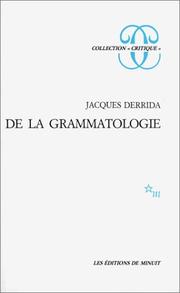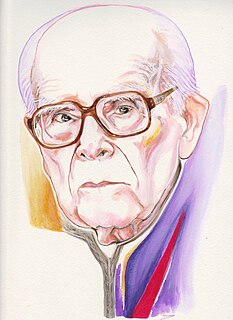
Jacques Derrida was an Algerian-born French philosopher best known for developing a form of semiotic analysis known as deconstruction, which he discussed in numerous texts, and developed in the context of phenomenology. He is one of the major figures associated with post-structuralism and postmodern philosophy.
Peter T. Daniels is a scholar of writing systems, specializing in typology. He was co-editor of the book The World's Writing Systems (1996), and he introduced the terms abjad and abugida as modern linguistic terms for categories of scripts.
"Logocentrism" is a term coined by the German philosopher Ludwig Klages in the early 1900s. It refers to the tradition of Western science and philosophy that regards words and language as a fundamental expression of an external reality. It holds the logos as epistemologically superior and that there is an original, irreducible object which the logos represents. According to logocentrism, the logos is the ideal representation of the Platonic ideal.
The Nambikwara is an indigenous people of Brazil, living in the Amazon. Currently about 1,200 Nambikwara live in indigenous territories in the Brazilian state of Mato Grosso along the Guaporé and Juruena rivers. Their villages are accessible from the Pan-American highway.
A letterform, letter-form or letter form, is a term used especially in typography, paleography, calligraphy and epigraphy to mean a letter's shape. A letterform is a type of glyph, which is a specific, concrete way of writing an abstract character or grapheme.
Difference is a key concept of philosophy, denoting the process or set of properties by which one entity is distinguished from another within a relational field or a given conceptual system. In the Western philosophical system, difference is traditionally viewed as being opposed to identity, following the Principles of Leibniz, and in particular, his Law of the identity of indiscernibles. In structuralist and poststructuralist accounts, however, difference is understood to be constitutive of both meaning and identity. In other words, because identity is viewed in non-essentialist terms as a construct, and because constructs only produce meaning through the interplay of differences, it is the case that for both structuralism and poststructuralism, identity cannot be said to exist without difference.
The linguist Ignace Gelb coined the term "grammatology" in 1952 to refer to the scientific study of writing systems or scripts. Grammatology can examine the typology of scripts, the analysis of the structural properties of scripts, and the relationship between written and spoken language. In its broadest sense, some scholars also include the study of literacy in grammatology and, indeed, the impact of writing on philosophy, religion, science, administration and other aspects of the organization of society. Historian Bruce Trigger associates grammatology with cultural evolution.

Positions is a 1972 book by the French philosopher Jacques Derrida.
Gregory Leland Ulmer is a professor in the Department of English at the University of Florida (Gainesville) and a professor of Electronic Languages and Cybermedia at the European Graduate School in Saas-Fee, Switzerland.
Electracy is a theory by Gregory Ulmer that describes the kind of skills and facility necessary to exploit the full communicative potential of new electronic media such as multimedia, hypermedia, social software, and virtual worlds. According to Ulmer, electracy "is to digital media what literacy is to print." It encompasses the broader cultural, institutional, pedagogical, and ideological implications inherent in the transition from a culture of print literacy to a culture saturated with electronic media. "Electracy" is the term he gives to what is resulting from this major transition that our society is undergoing. The term is a portmanteau word, combining "electrical" with "literacy", to allude to one of the fundamental terms used by the French philosopher Jacques Derrida to name the relational spacing that enables and delimits any signification in any medium.

Of Grammatology is a 1967 book by the French philosopher Jacques Derrida, in which the author discusses writers such as Claude Lévi-Strauss, Ferdinand de Saussure, Jean-Jacques Rousseau, Étienne Condillac, Louis Hjelmslev, Martin Heidegger, Edmund Husserl, Roman Jakobson, Gottfried Wilhelm Leibniz, André Leroi-Gourhan, and William Warburton. The book has been called a foundational text for deconstructive criticism.

Emmanuel G. Kriaras was a Greek lexicographer and philologist. He was Emeritus Professor of the School of Philosophy at the Aristotle University of Thessaloniki. He was a student of Jean Psychari and the practice and ideology of demotic Greek.
Sous rature is a strategic philosophical device originally developed by Martin Heidegger. Usually translated as 'under erasure', it involves the crossing out of a word within a text, but allowing it to remain legible and in place. Used extensively by Jacques Derrida, it signifies that a word is "inadequate yet necessary"; that a particular signifier is not wholly suitable for the concept it represents, but must be used as the constraints of our language offer nothing better.
Trace is one of the most important concepts in Derridian deconstruction. In the 1960s, Jacques Derrida used this word in two of his early books, namely Writing and Difference and Of Grammatology.
Supplement or Supplemental may refer to:
Graphemics or graphematics is the linguistic study of writing systems and their basic components, i.e. graphemes.
Essay on the Origin of Languages is an essay by Jean-Jacques Rousseau published posthumously in 1781. Rousseau had meant to publish the essay in a short volume which was also to include essays On Theatrical Imitation and The Levite of Ephraim. In the preface to this would-be volume, Rousseau wrote that the Essay was originally meant to be included in the Discourse on Inequality, but was omitted because it "was too long and out of place". The essay was mentioned in Rousseau's 1762 book, Emile.

Writing and Difference is a book by the French philosopher Jacques Derrida, collecting some of the early lectures and essays that established his international fame. It was published in 1967 alongside Of Grammatology and Speech and Phenomena.

The horizontal square script is an abugida developed by the monk and scholar Zanabazar to write Mongolian. It can also be used to write Tibetan and Sanskrit.





